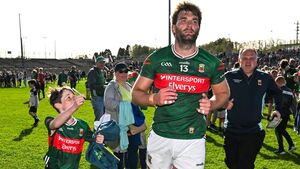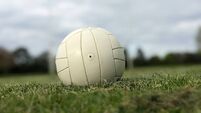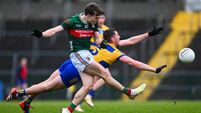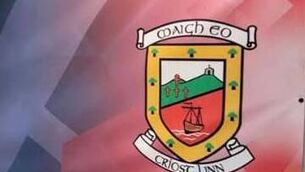Mayo’s Hiroo Onoda still stands tall

Aidan O'Shea leaves the pitch after Mayo's victory in the Connacht Senior Football Championship quarter-final against Sligo at Hastings Insurance MacHale Park in Castlebar last Sunday. The full-forward scored a goal and two points in a man of the match display. Picture: Sam Barnes/Sportsfile
With just over a minute to play in Castlebar, Niall Murphy clipped over a two pointer that brought Sligo back to within a goal. It silenced the hum of certainty in the stands. Mayo had looked to be inching clear throughout the last quarter, pulling away with the steady, assured stride of a team more used to the hard miles of the championship summer. But Sligo, to their credit, never bought the script. They had chipped and harried and played with the quiet conviction of a team that believed the day might just be theirs. And now all of a sudden, the great upset was possible.
Colm Reape stood over the kick-out with a kind of theatrical stillness. His restarts had been a source of unease all afternoon, and now he faced the most pressurised of them all. The kick was only ever going to be sent in the direction of one man. Aidan O’Shea, who had spent the afternoon grafting with that inexplicable blend of chaos and control, had wandered into the middle third, as if sensing the story would pass through him once more.
Sligo bodies were swarming, sniffing a first championship win over Mayo in MacHale Park since 1975. But as the ball arced out towards the stand side, it was clear the big moment was falling to Mayo’s biggest man. O’Shea rose and gathered it cleanly, and for a brief moment it felt like he could’ve even floated away with it as if it was filled with helium. But he eventually came down, securing both possession and Mayo’s pathway into the Connacht semi-final.
For long stretches, this was a Mayo performance stitched together with frayed thread. The fundamentals were all there – the running power, the clear physical edge, the sense that a burst of scores was imminent – but the execution was absent. From the opening moments, when Ryan O’Donoghue’s free dropped limply into the hands of Sligo goalkeeper Daniel Lyons, something felt slightly off-kilter. The first score of the game went to David Quinn, and Sligo only grew more comfortable from there.
Mayo, of course, had their moments. O’Donoghue’s first-half goal was taken with menace, the Belmullet man bouncing off Eddie McGuinness before drilling a low shot past Daniel Lyons. Jack Carney had a half-chance for a second but his effort was well saved. And yet, every time Mayo looked ready to pull clear, they faltered.
Sligo, meanwhile, gradually began to play with belief. From the 27th minute to the half-time whistle, they outscored Mayo five points to two. Alan McLoughlin even appeared to be considering going for goal for a split second after slicing through the Mayo defence, before opting to tap it over. And when Niall Murphy curled over his fourth point just before the break, Sligo had closed the gap to three. The half-time whistle had come at the wrong time for the visitors.
Through it all, O’Shea worked away in that indefinable role he has made his own. Drifting, absorbing, directing. As others flitted in and out, he remained fixed to the contest, like a hinge on which the entire afternoon swung.
The second-half began with Mayo hinting at a surge. O’Shea’s goal arrived early. He nonchalantly took the scenic route around the goalkeeper, slowed himself, and placed the ball in the net with the ease of a man popping into his local for a pint. It felt like a catalyst for Mayo to push clear.
But Sligo refused to wilt. Just minutes later, they landed a goal of their own. Pat Spillane fisted a clever ball across the square and Luke Towey, ghosting into the goalmouth, palmed it into the net. The response was immediate, sharp, and served notice that this game wasn’t done. Tension lingered.
There were still chances to kill the contest, but Mayo couldn't convert. And when Cian Lally tore through the middle of the Mayo defence on two occasions, MacHale Park stood still. The first time, he lashed the ball over when the net beckoned. The second time, he made no mistake, slicing through and hammering it in. Sligo’s belief rose once more.
As the exchanges grew more frantic, O’Shea’s role became more pronounced. In addition to his goal, he scored three points from play and had a crucial hand to play in several more. When Mayo needed control, he slowed it down. When they needed a foothold, he found it. He was less a forward and more a travelling blacksmith, fixing what needed fixing as he went.
There were solid performances elsewhere, too. Darren McHale looked sharp, drifting cleverly into space and tagging on four points from play in one of his best outings in a Mayo jersey. Jack Carney battled well, particularly when positioned closer to goal, while Dylan Thornton remedied the side’s league final woes by always offering Reape with a solid option from kick-outs. But by any measure, O’Shea was the standout performer.
The Breaffy man has heard it all by now – the speculation about whether this might be his last summer, the suggestion that his role should be reduced to cameo appearances off the bench, the whispers that his best days are behind him. But none of that mattered here.
When Mayo needed composure, power, presence, it was O’Shea who gave it to them. He scored a goal, won vital possession, and imposed himself across the pitch with the quiet authority of someone who no longer feels the need to prove anything, but ends up doing it anyway.
Mayo are still a team in progress. There are flaws to fix and bigger days ahead. But whatever version of themselves they’re building towards, O’Shea will remain central to it. Not a fading veteran. Not a luxury option. Just the anchor they need when they can’t find their footing.
In 1974, nearly three decades after the end of World War II, a Japanese soldier named Hiroo Onoda finally laid down his rifle. For years, he had lived in the jungles of the Philippines, convinced that the war was still going on. Efforts to bring him home had failed – he simply didn’t believe the fight was over. It was only when his former commanding officer was flown in to relieve him of duty that Onoda finally emerged from the trees.
But you just know that it will take more than a commanding officer for O’Shea to stand down.
Every summer, like clockwork, Mayo’s own Hiroo Onoda steps back into the cauldron of championship football – and Mayo breathes a little easier. Long may it last.




